期末总复习课件(共47张PPT) 人教版英语八年级上册
文档属性
| 名称 | 期末总复习课件(共47张PPT) 人教版英语八年级上册 | 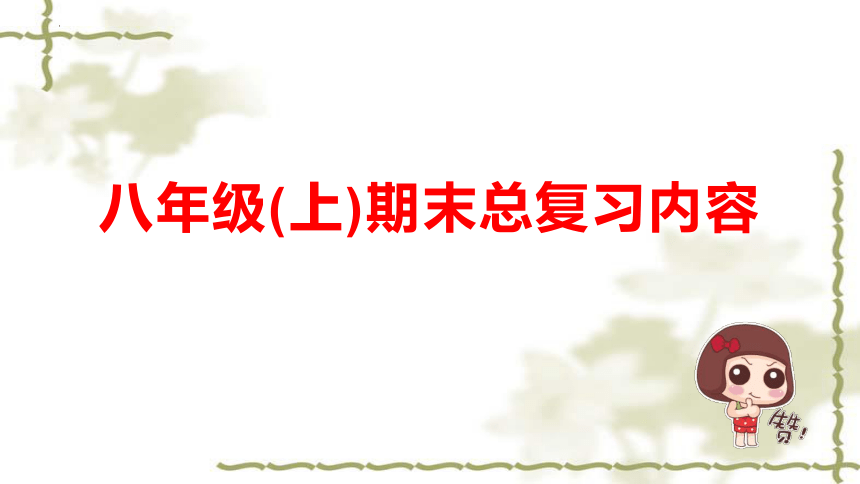 | |
| 格式 | pptx | ||
| 文件大小 | 483.7KB | ||
| 资源类型 | 教案 | ||
| 版本资源 | 人教新目标(Go for it)版 | ||
| 科目 | 英语 | ||
| 更新时间 | 2024-10-11 10:50:52 | ||
图片预览

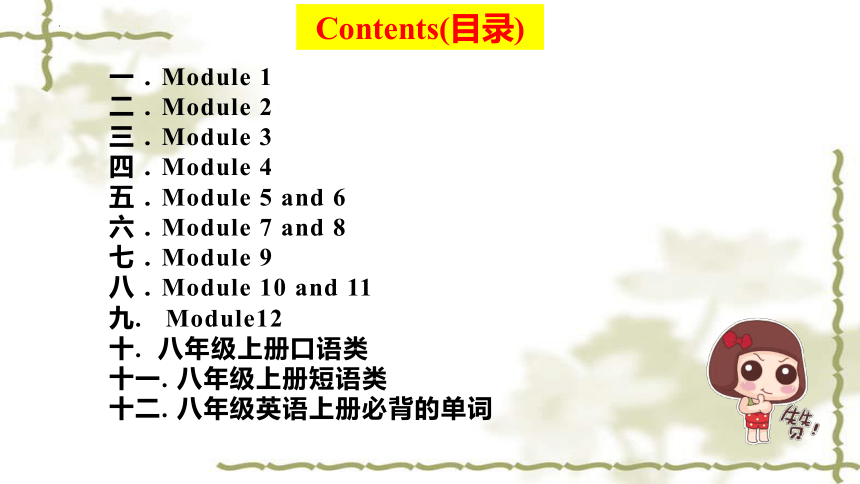
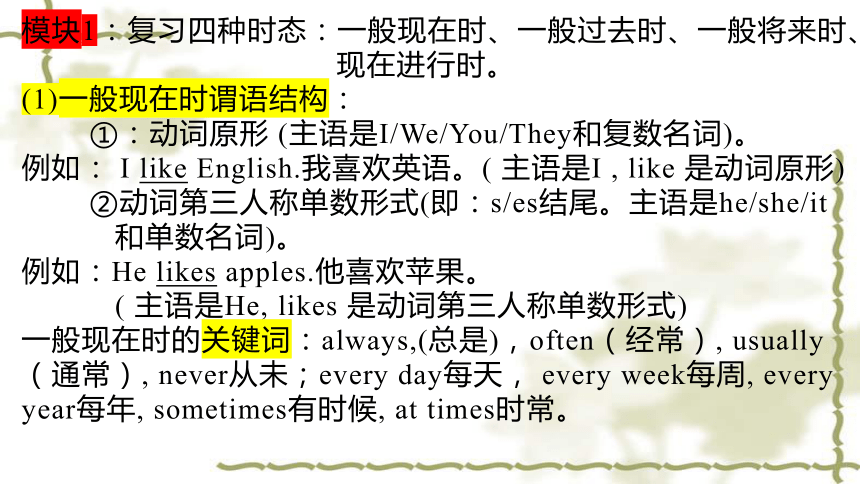
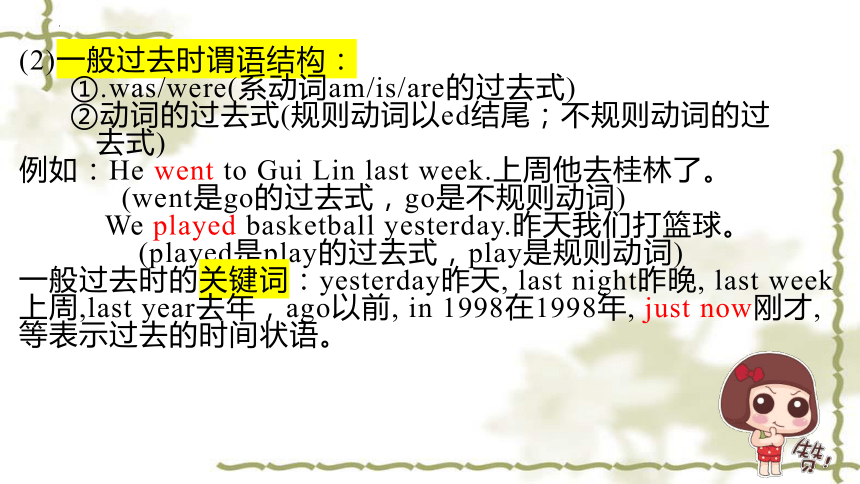
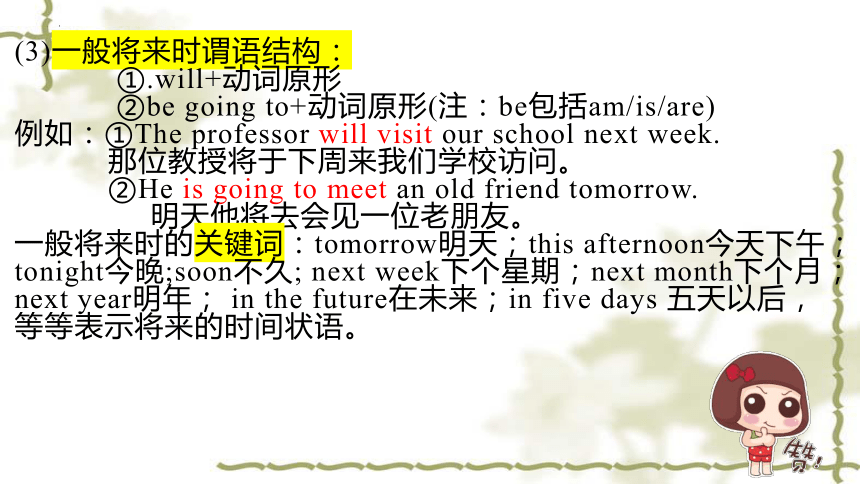
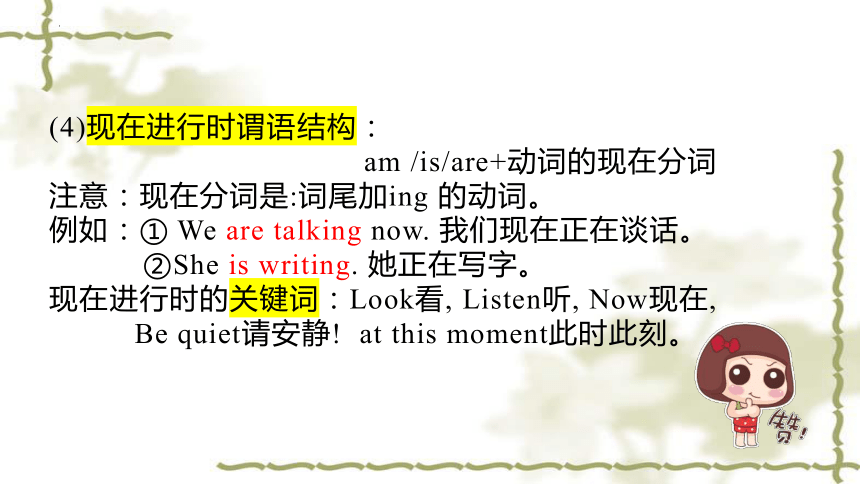
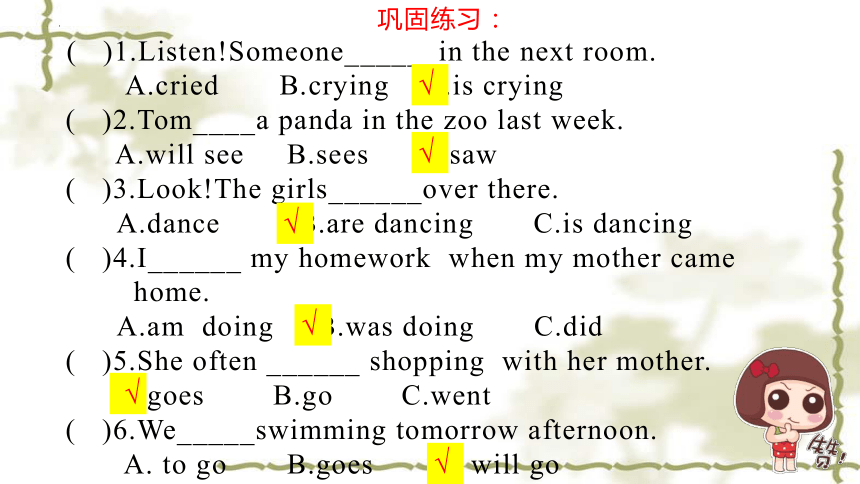
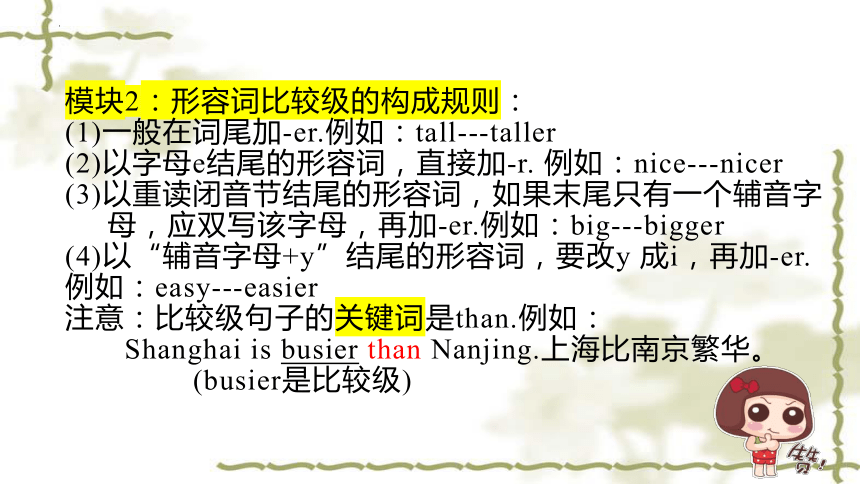
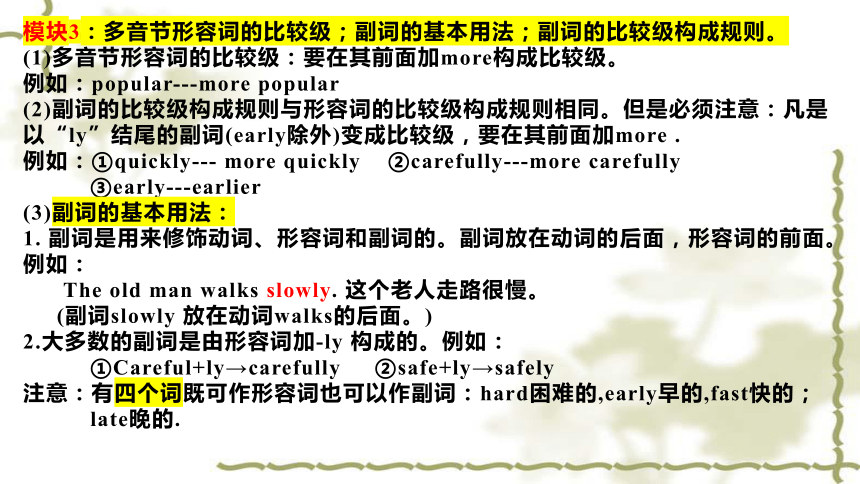
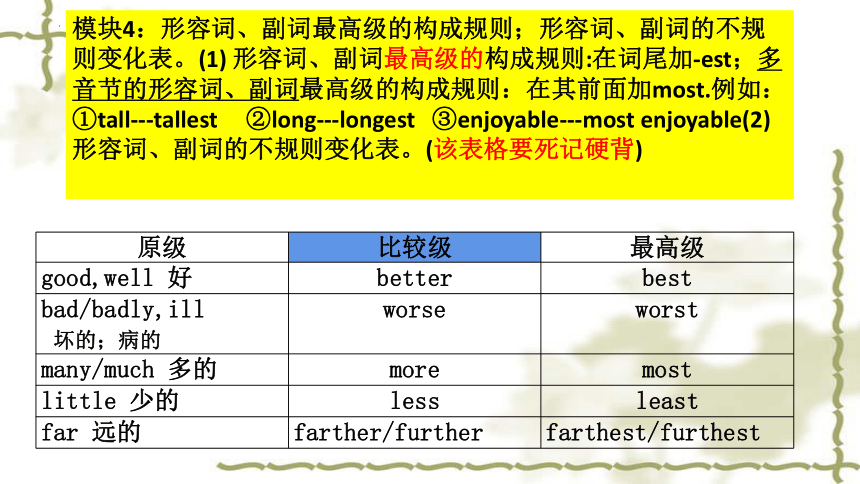
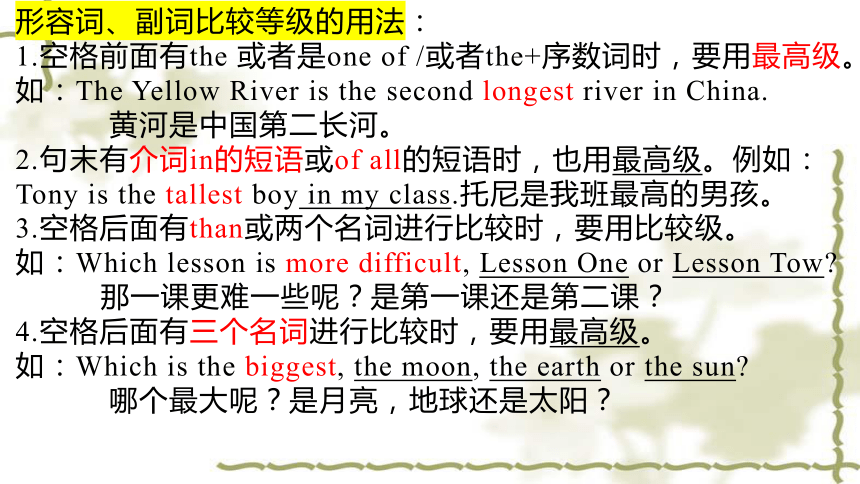
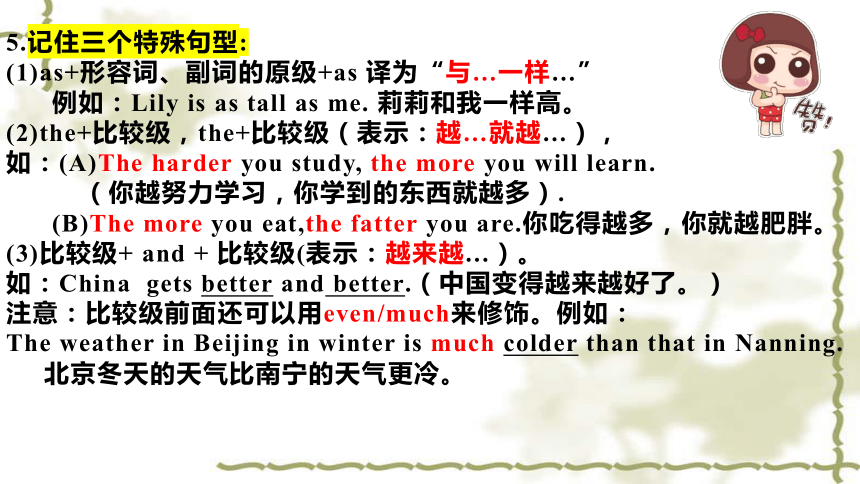
文档简介
(共47张PPT)
八年级(上)期末总复习内容
Module 1
Module 2
Module 3
Module 4
Module 5 and 6
Module 7 and 8
Module 9
Module 10 and 11
九. Module12
十. 八年级上册口语类
十一. 八年级上册短语类
十二. 八年级英语上册必背的单词
Contents(目录)
模块1:复习四种时态:一般现在时、一般过去时、一般将来时、
现在进行时。
(1)一般现在时谓语结构:
①:动词原形 (主语是I/We/You/They和复数名词)。
例如: I like English.我喜欢英语。( 主语是I , like 是动词原形)
②动词第三人称单数形式(即:s/es结尾。主语是he/she/it
和单数名词)。
例如:He likes apples.他喜欢苹果。
( 主语是He, likes 是动词第三人称单数形式)
一般现在时的关键词:always,(总是),often(经常), usually(通常), never从未;every day每天, every week每周, every year每年, sometimes有时候, at times时常。
(2)一般过去时谓语结构:
①.was/were(系动词am/is/are的过去式)
②动词的过去式(规则动词以ed结尾;不规则动词的过
去式)
例如:He went to Gui Lin last week.上周他去桂林了。
(went是go的过去式,go是不规则动词)
We played basketball yesterday.昨天我们打篮球。
(played是play的过去式,play是规则动词)
一般过去时的关键词:yesterday昨天, last night昨晚, last week上周,last year去年,ago以前, in 1998在1998年, just now刚才, 等表示过去的时间状语。
(3)一般将来时谓语结构:
①.will+动词原形
②be going to+动词原形(注:be包括am/is/are)
例如:①The professor will visit our school next week.
那位教授将于下周来我们学校访问。
②He is going to meet an old friend tomorrow.
明天他将去会见一位老朋友。
一般将来时的关键词:tomorrow明天;this afternoon今天下午;tonight今晚;soon不久; next week下个星期;next month下个月;next year明年; in the future在未来;in five days 五天以后,等等表示将来的时间状语。
(4)现在进行时谓语结构:
am /is/are+动词的现在分词
注意:现在分词是:词尾加ing 的动词。
例如:① We are talking now. 我们现在正在谈话。
②She is writing. 她正在写字。
现在进行时的关键词:Look看, Listen听, Now现在,
Be quiet请安静! at this moment此时此刻。
巩固练习:
( )1.Listen!Someone______in the next room.
A.cried B.crying C.is crying
( )2.Tom____a panda in the zoo last week.
A.will see B.sees C.saw
( )3.Look!The girls______over there.
A.dance B.are dancing C.is dancing
( )4.I______ my homework when my mother came
home.
A.am doing B.was doing C.did
( )5.She often ______ shopping with her mother.
A.goes B.go C.went
( )6.We_____swimming tomorrow afternoon.
A. to go B.goes C. will go
√
√
√
√
√
√
模块2:形容词比较级的构成规则:
(1)一般在词尾加-er.例如:tall---taller
(2)以字母e结尾的形容词,直接加-r. 例如:nice---nicer
(3)以重读闭音节结尾的形容词,如果末尾只有一个辅音字
母,应双写该字母,再加-er.例如:big---bigger
(4)以“辅音字母+y”结尾的形容词,要改y 成i,再加-er. 例如:easy---easier
注意:比较级句子的关键词是than.例如:
Shanghai is busier than Nanjing.上海比南京繁华。
(busier是比较级)
模块3:多音节形容词的比较级;副词的基本用法;副词的比较级构成规则。
(1)多音节形容词的比较级:要在其前面加more构成比较级。
例如:popular---more popular
(2)副词的比较级构成规则与形容词的比较级构成规则相同。但是必须注意:凡是以“ly”结尾的副词(early除外)变成比较级,要在其前面加more .
例如:①quickly--- more quickly ②carefully---more carefully
③early---earlier
(3)副词的基本用法:
1. 副词是用来修饰动词、形容词和副词的。副词放在动词的后面,形容词的前面。例如:
The old man walks slowly. 这个老人走路很慢。
(副词slowly 放在动词walks的后面。)
2.大多数的副词是由形容词加-ly 构成的。例如:
①Careful+ly→carefully ②safe+ly→safely
注意:有四个词既可作形容词也可以作副词:hard困难的,early早的,fast快的;
late晚的.
模块4:形容词、副词最高级的构成规则;形容词、副词的不规则变化表。(1) 形容词、副词最高级的构成规则:在词尾加-est;多音节的形容词、副词最高级的构成规则:在其前面加most.例如: ①tall---tallest ②long---longest ③enjoyable---most enjoyable(2)形容词、副词的不规则变化表。(该表格要死记硬背)
原级 比较级 最高级
good,well 好 better best
bad/badly,ill 坏的;病的 worse worst
many/much 多的 more most
little 少的 less least
far 远的 farther/further farthest/furthest
形容词、副词比较等级的用法:
1.空格前面有the 或者是one of /或者the+序数词时,要用最高级。
如:The Yellow River is the second longest river in China.
黄河是中国第二长河。
2.句末有介词in的短语或of all的短语时,也用最高级。例如:
Tony is the tallest boy in my class.托尼是我班最高的男孩。
3.空格后面有than或两个名词进行比较时,要用比较级。
如:Which lesson is more difficult, Lesson One or Lesson Tow
那一课更难一些呢?是第一课还是第二课?
4.空格后面有三个名词进行比较时,要用最高级。
如:Which is the biggest, the moon, the earth or the sun
哪个最大呢?是月亮,地球还是太阳?
5.记住三个特殊句型:
(1)as+形容词、副词的原级+as 译为“与…一样…”
例如:Lily is as tall as me. 莉莉和我一样高。
(2)the+比较级,the+比较级(表示:越…就越…),
如:(A)The harder you study, the more you will learn.
(你越努力学习,你学到的东西就越多).
(B)The more you eat,the fatter you are.你吃得越多,你就越肥胖。
(3)比较级+ and + 比较级(表示:越来越…)。
如:China gets better and better.(中国变得越来越好了。)
注意:比较级前面还可以用even/much来修饰。例如:
The weather in Beijing in winter is much colder than that in Nanning.
北京冬天的天气比南宁的天气更冷。
巩固练习:
( )1.Beijing,the capital of China ,is one of _____cities in the world.
A.the biggest B.bigger C.big
( )2.Dear students,please read every sentence carefully. ____you
are,____misstakes you’ll make.
A.The more carefully;the fewer B.The more careful;the less
C.The more careful;the fewer
( )3.--Tom,your handwriting is much ____than before.
--Thank you.
A.beautiful B.more beautiful C.beautifuler
( )4.China is developing ____of all the countries in the world.
A.the most fast B.fast C.fastest
( )5.Lily is ________girls in my class.
A.tall B.the tallest C.taller
√
√
√
√
√
( )7.She is good at painting.She can paint_____her teacher.
A.as better as B.as good as C.as well as
( )8.The programs on Channel 10 are ____better than Channel 5.
A.more B.much C.many
( )9.He is _____than any other students in his class.
A.tall B.taller C.tallest
( )10.The Yellow River is the second ____ rivers in China.
A.longest B.longer C.long
( )11.She was very _____when she heard her mother’s death.
A.sad B.happy C.excited
( )12.The ____friends you have,the ____you will be.
A.more;happy B.many;happy C.more;happier
( )13.In our city,it’s even ___ in January than in February.
A.cold B.colder C.coldest
( )14.Which city is______,Bei jing,Shang hai or Liuzhou
A.big B.bigger C.the biggest
√
√
√
√
√
√
√
√
模块5和6:动词不定式 (1)、(2)和双宾语。
1.动词不定式(带to的动词):to+动词原形(注:to do代表不定式)
例如:She wants to see her aunt.她想去看望她的阿姨。
(说明:to see是不定式)
注意:(1).后面接不定式的动词有:agree同意,afford负担得起, decide决定,promise承诺,plan计划,want想要,would like想要。
(2)在特殊疑问词what/which/how的后面也要接不定式。
(3)在you’d better的后面要接动词原形; make sb.+动词原形。
2.双宾语:动词后面带的间接宾语和直接宾语,叫做双宾语。
例如:
My brother gave me a book.我的哥哥给我一本书。
(me是间接宾语,book是直接宾语。)
巩固练习:
( )1.We plan______some apple trees next year.
A.plant B.to plant C.planting
( )2.You'd better______at home because of the heavy rain.
A.stay B.to stay C.staying
( )3.The woman made her son___finally after she told him
some jokes.
A.laughed B.to laugh C.laugh
( )4.My parents often tell us _____to the teacher carefully in class.
A.listen B.to listen C.listening
( )5.I would like______ maths(数学),I think it's hard( 困难的).
A. drop( 放弃) B.dropping C.to drop
( )6.There is no difference between the two words.I don't
know which_______.
A.to choose B.choose C.choosing
√
√
√
√
√
√
模块7和8:过去进行时(1)、(2)
1.过去进行时的谓语结构:
was/were +动词的现在分词(ing结尾)
例如: ①I was watching TV at that time.当时我正在看电视。
②They were having PE lesson at 11:00 yesterday.
昨天上午11点他们正在上体育课。
2.过去进行时的关键词:
at this time yesterday昨天这个时候 ,at 8:00 last night昨晚八点钟,at that time在那时,或者是由while/when 引导的时间状语从句。
巩固练习:
( )1.We ______English lesson at 9:00 yesterday.
A.have B.were having C.are having
( )2.Lucy _____a book at 8:00 last night.
A.is reading B.reads C.was reading
( )3.I______my homework while my father was reading newspaper.
A.was doing B.do C.am doing
( )4.She____TV at 8:00 last night.
A.is watching B.watches C.was watching
( )5.The students_____apples trees at this time yesterday.
A.are planting B.were planting C.planted
√
√
√
√
√
模块9:冠词和数字
一、英语中的冠词分为:不定冠词(a/an)和定冠词(the)。用法如下:
1、读音是以辅音开头的单词,要用a。如:a pen ; a university,
2、读音是以元音开头的单词,要用an。如:an orange; an hour;
an ugly man,;an English book
3、在介绍说明的文段中,第一次出现的名词前面用a/an,第二次以上出现的名词前面
要用the .
如:This is a book.The book is Lily’s.这是一本书,这本书是莉莉的。
4、在特定的人或物名词前面,要用the。
如:He is the boy that I want to find. 他就是我要找的男孩。
5.说话人双方都知道的人或物名词前,用the。
如:-Do you know the woman in red 你认识那位穿红衣服的妇女吗?
-Yes,I do.是的,我认识。
6、在形容词最高级和序数词前面,要用the。如:
The first lesson is more interesting . 第一课更有趣。(first是序数词)
7、一些形容词表示某类人时,也要用the。
如:the rich(富人), the poor(穷人), the old(老人);
8、在姓氏的复数(表示一家人或夫妇二人)的前面时用the).the Smiths 史密斯全家).
9、在乐器的名词前面用the. 如:I can play the piano. 我会弹钢琴.
10、在天体类的名词(表示独一无二)前面用the。如:
The moon goes round the earth. 月亮绕着地球转.
★注意:不能用冠词(即零冠词)的情况:
1.在国家、人名、节日名词前不能加冠词(a, an, the).
如:①China is a big country . 中国是个大国.
② Lily is a kind girl. 莉莉是善良的女孩
2、在季节、月份、星期前不能用冠词。
如:①The trees turn green in spring. 树木在春天变得绿了。
②We will go to Guilin in August.我们将于八月份去桂林。
3、在一日三餐、球类运动、娱乐活动(下棋、打牌等)的名词前不加冠词。如:
①Have breakfast(吃早餐), ② play football(踢足球), ③play chess(下棋)
☆注意:记住下列固定短语:the USA美国,the UK英国,the Internet网络。
the day before yesterday前天
特殊情况:1.a university一所大学 a European一位欧洲人
2.an hour一个小时 an honest man 一个诚实的人
巩固练习:选择题
( )1.A little boy wrote ___“u”and ____“n”on the wall.
A.an;a B.an;an C.a;an
( )2.On_______Sundays,I stay in bed till twelve o’clock.
A.a B.the C./
( )3.I like to play ____basketball,but my brother likes to
play____guitar(吉他).
A./;the B./;/ C.the;the
( )4.Do you know ____man who is sitting over there
A.a B.the C./
( )5.I like playing _____ chess(下棋) with my friends.
A.a B.the C./
( )6.They arrived at our school ______day before yesterday.
A./ B.an C.the
( )7.He likes playing_______piano(钢琴).
A.a B.the C.an
( )8.Gui Lin is_______most beautiful(最美丽的) city in China.
A.the B.an C.a
√
√
√
√
√
√
√
√
( )9.We live on ______second(第二) floor.
A.a B.the C.an
( )10. It’s too hot.Open________door(门),please.
A.a B.an C.the
( )11.I believe that _____young(年轻人) have a gbright future(光明的
前途).
A.a B.an C.the
( )12.______sun rises in the east(东方).
A. The B. A C.An
( )13.I have_______umbrella(雨伞).
A.a B.an C.the
( )14.Lei Feng is ______honest man.
A. the B. a C.an
( )15.Guang Touqiang is _______ugly(丑陋的) man.
A.an B. a C.the
√
√
√
√
√
√
√
二、数字
1.基数词:zero,one,two,three,four,five,six,seven,eight,nine,ten
2.序数词:first,second,third,fourth,fifth,sixth,seventh,eighth,ninth,tenth
3.分数的表达法:分数用基数词,分母用序数词;当分数大于1时,分
母要加s.
如:三分之一:one third 五分之二:two fifths
4.数字单位量词:hundred百,thousand千,million百万,billion十亿
这四个量词的用法:(1)当空格前面有具体数字时,这些词要用单数
形式。例如:
There are 8 hundred students in our school.(我们学校有800个学生)
(2)当空格前面没有具体数字时,要用这些词的“复数形式+of”的
短语。
例如:Millions of people come to Shanghai. 数万人来上海。
(说明:空格前面没有具体数词)
巩固练习:选择题
( )1.--How much does it cost to build the school library
--Four_____yuan.
A.million B.millions C.millions of
( )2.There were ____people dying in Si Chuan earthquake
in 2008.
A.thousand B.thousands C.thousands of
√
√
模块10和11:情态动词may/might表示“可能”和情态动词must,can/ need的用法
1、情态动词后面要接动词原形。
如:I can speak English.我会说英语。
2、can译为“能,会”。表示人的能力。否定式Can’t:意为“不会,不可能(表示否定的猜测)”
如:I can speak Chinese.我会说汉语。
3. may意为“可以,可能”,表示许可或礼貌的请求。如:
May I come in 我可以进来吗?
4.must “必须,一定”。表示建议或有把握的猜测。(否定式mustn’t译为:不准)
如:You must listen to your teacher carefully in class.
上课时,你必须认真听老师讲课。
5.should“应该”。例如:
We should study hard.我们应该努力学习。
※注意:(1)以can或may 开头的问句时,肯定回答用can/may;否定回答用can’t/ mustn’t 或者you’d better not (你最好不要…).
例如:-May I put my bike here -No, You’d better not.(No,you mustn’t.)
我能把自行车放这里吗? 你最好不要放这。
(2)以must开头的问句,肯定回答用must;否定回答要用needn’t(不必要)。
如: --Must I go now 我现在得走了吗?
--No, you needn’t.不,你不必要走。
巩固练习:选择题
( )1.-Must I finish the work today,Mum
-No,you ____.You can finish it tomorrow.
A.mustn’t B.can’t C.needn’t
( )2.-Who is the man over there Is it Mr Li
-No,it ____be him.Mr Li is much taller.
A.mustn’t B.can’t C.needn’t
( )3.You ___break anything in Spring Festival.
A.may B.can C.mustn’t
( )4.-___you swim -Yes.I’m good at it.
A.May B.Can C.Must
( )5.--___ I speak to Smith (打电话用语)
--Hang on,please.
A. Shall B.Will C.May
√
√
√
√
√
模块12:祈使句
1.祈使句的概念:表示叮嘱、劝告、禁止、建议、请求或命令的句子,
叫做祈使句。
2.祈使句的句型结构:以动词原形开头,无时态和数的变化。
例如:Open the door,please.请开门。
3.祈使句的否定句:由don’t或never开头。
例如:Don’t waste your time! 别浪费你的时间了!
4.以let’s/please开头的祈使句,表示提出建议(let’s/please+动词原形):
例如:Let’s go home! 咱们回家吧!
5.无动词的祈使句:这类句子表示请示、命令和口号。
例如:①This way,please!请这边走!② Just a minute,please!请稍等!
6.No+动词ing形式:表示禁止。
例如:① No smoking!禁止吸烟! ②No parking!禁止停车!
巩固练习(祈使句):
( )1._____me,please.
A.Following B.To follow C.Follow
( )2.Please _____the window.
A.close B.closing C.to close
( )3.Let’s____basketball after school.
A.to play B.playing C.play
( )4._____the lift.
A.No use B.Don’t use C.Using
( )5._____a nice day!
A.Having B.Has C.Have
( )6.Mary,_____ your homework to school tomorrow.
A.bring B.to bring C.brings
( )7._____be late for school again,Tom.
A.Not B.Doesn’t C.Don’t
√
√
√
√
√
√
√
八年级上册英语口语
1.--Could you tell me which is the way to Room 209
你能告诉我去209房间的路吗
--This way,please. 请这边走。
2.—It’s going to rain.We can’t go to South Mountain.
要下雨了。我们不能去南山了。
--What a pity!真遗憾啊!
3.--Why not go to the park with me this weekend
这个周末为什么不跟我去公园呢
--Good idea.好主意。
4.--You look so sad,Grace.What’s the matter
你看上去这么伤心,格雷斯。你怎么啦
--I lost my wallet.
我的钱包搞丢了。
5.—How far is it from your home to school
你家离学校有多远
--About 5 kilometers.大约5公里。
6.--Who is taller,Jack or Mike --Jack. 杰克更高。
Jack 和Mike 谁更高
7.—What’s the weather like today --It’s sunny.
今天天气怎样 晴朗的。
8.—You should always speak English in class.
你应该在课堂上总是讲英语。
--Good idea.好主意。
9.—Is she from England 她来自英国吗
--Yes,she is.是的,她是。
10.—How about listening to the radio in English
听英语广播怎么样
--That’s a good idea.这是个好主意。
11.--Sorry I don’t know to do it.
对不起,我不知道怎么做。
--It doesn’t matter.没关系。
12.--Do you often watch English movies --Yes,I do.
你经常看英语电影吗 是的,我经常看。
13.--Hi,Lingling,how was your weekend
你好,玲玲。你的周末过得怎么样
--Pretty good.很好。
14.—Remember to visit the Diwang Tower in Shenzhen.
记得在深圳要去参观帝王塔。
--OK,I will.好的,我会的。
15.—What’s the population of your hometown
你的家乡人口多少
--About 3 million.大约3百万。
16.—Would you like to go shopping with me this afternoon
今天下午你愿意跟我去购物吗
--Yes,I’d love to. 是的,我愿意。
17.—Is London an old city or a new city
伦敦是一个旧的城市还是新的城市
-- An old city.一个旧的城市。
18.—You look beautiful today,Mary.
玛丽,你今天看上去很漂亮。
--Thank you.谢谢。
19.—What’s the matter with you ,Tony
托尼,你怎么啦
--I hurt my knee.我的膝盖受伤了。
20.—Which sport do you like,swimming or running
游泳和跑步,你更喜欢哪一种运动
--Swimming.游泳。
21.--Oh,they missed the football match last night.
哦,昨晚他们输了足球比赛。
--Oh,bad luck.哦,真倒霉。
22.—Hello,my name is Lucy Brown.
你好,我叫Lucy Brown。
--Nice to meet you.见到你很高兴。
23.--Could you tell me the best way to get there
你能告诉我去那里最好的路吗
--Sure.可以。
24. --Does Tony go to school by bus
托尼坐公交车上学吗
--Yes,he does.是的,他是。
25.—Let’s go to Lao She Teahouse today.
今天咱们去老舍茶馆吧。
--That’s a good idea.这是个好主意。
26.--How often do you go to the cinema
你多久去一次电影院
--Once a week.每周一次。
27.—Where does the story take place
这个故事发生在哪里
--In Beijing.在北京。
28.—What’s your favourite animal
你最喜欢的动物是什么
--Monkey.猴子。
29.—Why do you like pandas 你为什么喜欢熊猫
--Because they are cute.因为它们很可爱。
30.—Did you have a good time in the zoo
你在动物园过得愉快吗
--Yes,I did.是的。
31.—Was she reading a book by the river
她正在河边看书吗
--Yes,she was.是的,她是。
32.—Where did you go last weekend 上个周末你去哪里
--To the beach.去海滩。
33.—What were you doing at 8Pm yesterday
昨天晚上8点你正在干什么
--I was watching TV.我在看电视。
34.—What time is it now by your watch 现在你的手表几点钟了
--It’s 3:00. (3点钟了。)
35.—Don’t listen to music when you ride your bike.
当你骑车时不要听音乐。
--OK,I won’t.好的,我不会听了。
36.--You look pale.Are you all right 你看起来脸色苍白。你还好吗
--I am OK.我很好。
37.—How much is the book 这本书多少钱
--It’s 40 yuan. 40元。
38.—Thank you for inviting me to your party.
感谢你邀请我参加你的聚会
--You’re welcome.不用谢。
39.—Hello,may I speak to David
喂,我可以找 David接电话吗
--Hang on,please. 请稍等。
40.--What’s the temperature right now 现在温度多少
--8 degrees. 8度。
41.--Happy birthday to you,Mary.祝你生日快乐,玛丽。
--Thank you. 谢谢你。
口语交际巩固练习:
( )1.--Could you tell me which is the way to Room 209
--__________.
A.Thank you. B. This way,please C.You’re right.
( )2.--It’s going to rain.We can’t go to South Mountain.
--___________.
A.I don’t like it B.Good idea C. What a pity!
( )3.--How far is it from your home to school
--____________.
A.About 5 kilometers. B.It’s small. C.It’s famous.
( )4.--What’s the weather like today --__________.
A.It’s red. BYes,it is. C.It’s sunny.
( )5.--Hello,may I speak to David --__________.
A.I am Lilei. B. Hang on,please.
C.Thank you very much.
B
C
A
C
B
( )6.--Sorry I don’t know to do it.
--__________.
A.It doesn’t matter. B.You’re right. C.OK
( )7.--Would you like to go shopping with me this afternoon
--___________.
A.Yes,it does. B.What a pity! C.Yes,I’d love to.
( )8.--Was she reading a book by the river --__________.
A.Oh,really B.Yes,she was. C.She was a girl.
( )9.--How much is the book --____________.
A.It’s 40 yuan. B.It’s a dog. C.It’s about 25 kilometers
( )10.--Happy birthday to you,Mary. --__________.
A.Happy birthday to you. B.Nice to meet you.
C.Thank you.
( )11.--What’s the temperature right now --_________.
A.It’s rainy. B. 8 degrees. C.It’s white.
A
C
B
A
C
B
八年级 (上册)短语类
1.agree with sb.同意某人 16.ask for a leave请假
2.as…as和…一样 17.at the age of在…岁时
3.at last最后 18.be good for对…有益
4.be/come from来自… 19. be different from与…不同
5.be famous for以…而出名 20.because of+名词:由于…
6.be sure确信 21.cut one’s hair理发
7. between …and在…和…之间 22. enjoy oneself过得快乐
8.come true实现 23. from …to从…到…
9.each other互相 24. get on well with与…相处融洽
10. fall down掉下 25. get to到达
11.first aid急救 26.have to不得不
12. get angry with生某人的气 27.help sb. with sth.帮助某人做某事
13.get on/off上车/下车 28.hear about/of听说
14.go off 熄灭 ,停电 29.look up查找(在字典、网络中查找)
15. have a good time玩得高兴 30.stay away from远离…
31.ask for help 呼救 49.close down关闭
32.pay attention to 关注;注意 50.in time 及时
33.in order to为了 51.in the middle of 在…中间
34.in danger濒危 ;处于危险中 52.live on以…为食
35. less and less越来越少 53.make friends with 与…交朋友
36. look after照顾 54. of course当然可以
37.none of(多数之中)没有一个 55. on time按时
38.not only… but also不但…而且 56. one of其中之一
39.on earth 究竟 57. sell out卖完
40.once or twice一两次 58.say goodbye to sb.与某人告别
41.raise money 筹钱 59. shake hands 握手
42.send sth. to sb.发送某物给某人 60.so…that 如此…以至于
43.say hello to sb.向某人问好 61. stand in a line排队
44.show sb. around带某人参观某地 62.think about 考虑
45.smile at sb.对某人微笑 63.write down写下,记下
46.the way to到…的路 64.in short 总之
47.thousands of成千上万 65.at the bottom of 在…的底部
48.walk along沿着…走 66.hang on稍等
31.thousands of成千上万
32.walk along沿着…走
33.side by side 并排地
34.in the end最后;终于
35.ask for a leave请假
36.at the age of在…岁时
37.be good for对…有益
38. be different from与…不同
39.because of+名词:由于…
40.cut one’s hair理发
41. enjoy oneself过得快乐
42. from …to从…到…
43. get on well with与…相处融洽
44. get to到达
45.have to不得不
46.help sb. with sth.帮助某人做某事
47.hear about/of听说
48.look up查找(在字典、网络中查找)
49.stay away from远离…
50.close down关闭
51.in time 及时
52.in the middle of在中间
53.live on以…为食
54.make friends with 与…交朋友
55. of course当然可以
56. on time按时
57. one of其中之一
58. sell out卖完
59.say goodbye to sb.与某人告别
60. shake hands with sb.与某人握手
61.so…that 如此…以至于
62. stand in a line排队
63.think about 考虑
64.write down写下,记下
65.in short 总之
66.at the bottom of 在…的底部 67.hang on稍等
68.take away 夺去;侵占
八年级英语上册必背的单词(共76个)
以a开头的单词:
1.act幕 2.accept 接受3.accident交通事故 4. allow允许5.appear出现
6.area区域
以b开头的单词:
1.broken破碎的
以c开头的单词:
1.calm镇静的 2.careless粗心的 3.cheer为…加油 4.choice选择
6.correct改正 6.classmate同班同学 7.college大学 8.common普通的 9.compare与…作比较 plete使完整 11.countryside乡下
12.corner拐角 13.crowded 拥挤的
以d开头的单词:
1.describe描述 2.develop培养 3.drop使落下 4.dry干的
以e开头的单词:
1.enough足够的 2.especially尤其 3.except除…之外 4.excellent出色的 5.experience经验
以f开头的单词:
1.feed喂 2.field田地
以g开头的单词:
1.gift礼物 2.government政府 3.grammar语法 4.ground地面
以h开头的单词:
1.harmful有害的
以i开头的单词:
1.immediately 立刻 2.improve提高;改进 3.inside在里面
4.interested感兴趣的
以l开头的单词:
1.lift电梯 2.local当地的 3.loudly大声地 4.low低的
以m开头的单词:
1.main主要的 2.magic魔术 3.mind介意 4.mistake错误的
5.mountain 山脉
以n开头的单词:
1.neither也不 2.notice注意到
以o开头的单词:
1.outside在外面
以p开头的单词:
pale苍白的park停泊 peace和平共pollution污染power电 present礼物 probably可能protect保护 public公共的
以r开头的单词:
1.relaxing使人放松的 2.risk风险 3.rubbish垃圾
以s开头的单词:
1.shy害羞的 2.situation形势 3.southeast东南 4.stay 停留
5.suddently 突然地 6.surprise惊奇
以t开头的单词:
1.temperature温度 2.terrible可怕的 3.throw扔;掷
4.twentieth第二十 5.twice两次
以v开头的单词:
1.video视频的
巩固练习:根据汉语写出单词
1.接受________ 2.交通事故__________ 3.镇静的________
4.同班同学_________ 5.大学___________ 6.拥挤的_________
7.干的_________ 8.足够的__________ 9.尤其__________
10.出色的_________ 11.田地___________ 12.礼物_________
13.电梯_________ 14.当地的_________ 15.介意_________
16.政府__________ 17.也不___________ 18.苍白的_______
19.污染__________ 20.电____________ 21.可能________
22.保护_________ 23.垃圾__________ 24.温度________
八年级(上)期末总复习内容
Module 1
Module 2
Module 3
Module 4
Module 5 and 6
Module 7 and 8
Module 9
Module 10 and 11
九. Module12
十. 八年级上册口语类
十一. 八年级上册短语类
十二. 八年级英语上册必背的单词
Contents(目录)
模块1:复习四种时态:一般现在时、一般过去时、一般将来时、
现在进行时。
(1)一般现在时谓语结构:
①:动词原形 (主语是I/We/You/They和复数名词)。
例如: I like English.我喜欢英语。( 主语是I , like 是动词原形)
②动词第三人称单数形式(即:s/es结尾。主语是he/she/it
和单数名词)。
例如:He likes apples.他喜欢苹果。
( 主语是He, likes 是动词第三人称单数形式)
一般现在时的关键词:always,(总是),often(经常), usually(通常), never从未;every day每天, every week每周, every year每年, sometimes有时候, at times时常。
(2)一般过去时谓语结构:
①.was/were(系动词am/is/are的过去式)
②动词的过去式(规则动词以ed结尾;不规则动词的过
去式)
例如:He went to Gui Lin last week.上周他去桂林了。
(went是go的过去式,go是不规则动词)
We played basketball yesterday.昨天我们打篮球。
(played是play的过去式,play是规则动词)
一般过去时的关键词:yesterday昨天, last night昨晚, last week上周,last year去年,ago以前, in 1998在1998年, just now刚才, 等表示过去的时间状语。
(3)一般将来时谓语结构:
①.will+动词原形
②be going to+动词原形(注:be包括am/is/are)
例如:①The professor will visit our school next week.
那位教授将于下周来我们学校访问。
②He is going to meet an old friend tomorrow.
明天他将去会见一位老朋友。
一般将来时的关键词:tomorrow明天;this afternoon今天下午;tonight今晚;soon不久; next week下个星期;next month下个月;next year明年; in the future在未来;in five days 五天以后,等等表示将来的时间状语。
(4)现在进行时谓语结构:
am /is/are+动词的现在分词
注意:现在分词是:词尾加ing 的动词。
例如:① We are talking now. 我们现在正在谈话。
②She is writing. 她正在写字。
现在进行时的关键词:Look看, Listen听, Now现在,
Be quiet请安静! at this moment此时此刻。
巩固练习:
( )1.Listen!Someone______in the next room.
A.cried B.crying C.is crying
( )2.Tom____a panda in the zoo last week.
A.will see B.sees C.saw
( )3.Look!The girls______over there.
A.dance B.are dancing C.is dancing
( )4.I______ my homework when my mother came
home.
A.am doing B.was doing C.did
( )5.She often ______ shopping with her mother.
A.goes B.go C.went
( )6.We_____swimming tomorrow afternoon.
A. to go B.goes C. will go
√
√
√
√
√
√
模块2:形容词比较级的构成规则:
(1)一般在词尾加-er.例如:tall---taller
(2)以字母e结尾的形容词,直接加-r. 例如:nice---nicer
(3)以重读闭音节结尾的形容词,如果末尾只有一个辅音字
母,应双写该字母,再加-er.例如:big---bigger
(4)以“辅音字母+y”结尾的形容词,要改y 成i,再加-er. 例如:easy---easier
注意:比较级句子的关键词是than.例如:
Shanghai is busier than Nanjing.上海比南京繁华。
(busier是比较级)
模块3:多音节形容词的比较级;副词的基本用法;副词的比较级构成规则。
(1)多音节形容词的比较级:要在其前面加more构成比较级。
例如:popular---more popular
(2)副词的比较级构成规则与形容词的比较级构成规则相同。但是必须注意:凡是以“ly”结尾的副词(early除外)变成比较级,要在其前面加more .
例如:①quickly--- more quickly ②carefully---more carefully
③early---earlier
(3)副词的基本用法:
1. 副词是用来修饰动词、形容词和副词的。副词放在动词的后面,形容词的前面。例如:
The old man walks slowly. 这个老人走路很慢。
(副词slowly 放在动词walks的后面。)
2.大多数的副词是由形容词加-ly 构成的。例如:
①Careful+ly→carefully ②safe+ly→safely
注意:有四个词既可作形容词也可以作副词:hard困难的,early早的,fast快的;
late晚的.
模块4:形容词、副词最高级的构成规则;形容词、副词的不规则变化表。(1) 形容词、副词最高级的构成规则:在词尾加-est;多音节的形容词、副词最高级的构成规则:在其前面加most.例如: ①tall---tallest ②long---longest ③enjoyable---most enjoyable(2)形容词、副词的不规则变化表。(该表格要死记硬背)
原级 比较级 最高级
good,well 好 better best
bad/badly,ill 坏的;病的 worse worst
many/much 多的 more most
little 少的 less least
far 远的 farther/further farthest/furthest
形容词、副词比较等级的用法:
1.空格前面有the 或者是one of /或者the+序数词时,要用最高级。
如:The Yellow River is the second longest river in China.
黄河是中国第二长河。
2.句末有介词in的短语或of all的短语时,也用最高级。例如:
Tony is the tallest boy in my class.托尼是我班最高的男孩。
3.空格后面有than或两个名词进行比较时,要用比较级。
如:Which lesson is more difficult, Lesson One or Lesson Tow
那一课更难一些呢?是第一课还是第二课?
4.空格后面有三个名词进行比较时,要用最高级。
如:Which is the biggest, the moon, the earth or the sun
哪个最大呢?是月亮,地球还是太阳?
5.记住三个特殊句型:
(1)as+形容词、副词的原级+as 译为“与…一样…”
例如:Lily is as tall as me. 莉莉和我一样高。
(2)the+比较级,the+比较级(表示:越…就越…),
如:(A)The harder you study, the more you will learn.
(你越努力学习,你学到的东西就越多).
(B)The more you eat,the fatter you are.你吃得越多,你就越肥胖。
(3)比较级+ and + 比较级(表示:越来越…)。
如:China gets better and better.(中国变得越来越好了。)
注意:比较级前面还可以用even/much来修饰。例如:
The weather in Beijing in winter is much colder than that in Nanning.
北京冬天的天气比南宁的天气更冷。
巩固练习:
( )1.Beijing,the capital of China ,is one of _____cities in the world.
A.the biggest B.bigger C.big
( )2.Dear students,please read every sentence carefully. ____you
are,____misstakes you’ll make.
A.The more carefully;the fewer B.The more careful;the less
C.The more careful;the fewer
( )3.--Tom,your handwriting is much ____than before.
--Thank you.
A.beautiful B.more beautiful C.beautifuler
( )4.China is developing ____of all the countries in the world.
A.the most fast B.fast C.fastest
( )5.Lily is ________girls in my class.
A.tall B.the tallest C.taller
√
√
√
√
√
( )7.She is good at painting.She can paint_____her teacher.
A.as better as B.as good as C.as well as
( )8.The programs on Channel 10 are ____better than Channel 5.
A.more B.much C.many
( )9.He is _____than any other students in his class.
A.tall B.taller C.tallest
( )10.The Yellow River is the second ____ rivers in China.
A.longest B.longer C.long
( )11.She was very _____when she heard her mother’s death.
A.sad B.happy C.excited
( )12.The ____friends you have,the ____you will be.
A.more;happy B.many;happy C.more;happier
( )13.In our city,it’s even ___ in January than in February.
A.cold B.colder C.coldest
( )14.Which city is______,Bei jing,Shang hai or Liuzhou
A.big B.bigger C.the biggest
√
√
√
√
√
√
√
√
模块5和6:动词不定式 (1)、(2)和双宾语。
1.动词不定式(带to的动词):to+动词原形(注:to do代表不定式)
例如:She wants to see her aunt.她想去看望她的阿姨。
(说明:to see是不定式)
注意:(1).后面接不定式的动词有:agree同意,afford负担得起, decide决定,promise承诺,plan计划,want想要,would like想要。
(2)在特殊疑问词what/which/how的后面也要接不定式。
(3)在you’d better的后面要接动词原形; make sb.+动词原形。
2.双宾语:动词后面带的间接宾语和直接宾语,叫做双宾语。
例如:
My brother gave me a book.我的哥哥给我一本书。
(me是间接宾语,book是直接宾语。)
巩固练习:
( )1.We plan______some apple trees next year.
A.plant B.to plant C.planting
( )2.You'd better______at home because of the heavy rain.
A.stay B.to stay C.staying
( )3.The woman made her son___finally after she told him
some jokes.
A.laughed B.to laugh C.laugh
( )4.My parents often tell us _____to the teacher carefully in class.
A.listen B.to listen C.listening
( )5.I would like______ maths(数学),I think it's hard( 困难的).
A. drop( 放弃) B.dropping C.to drop
( )6.There is no difference between the two words.I don't
know which_______.
A.to choose B.choose C.choosing
√
√
√
√
√
√
模块7和8:过去进行时(1)、(2)
1.过去进行时的谓语结构:
was/were +动词的现在分词(ing结尾)
例如: ①I was watching TV at that time.当时我正在看电视。
②They were having PE lesson at 11:00 yesterday.
昨天上午11点他们正在上体育课。
2.过去进行时的关键词:
at this time yesterday昨天这个时候 ,at 8:00 last night昨晚八点钟,at that time在那时,或者是由while/when 引导的时间状语从句。
巩固练习:
( )1.We ______English lesson at 9:00 yesterday.
A.have B.were having C.are having
( )2.Lucy _____a book at 8:00 last night.
A.is reading B.reads C.was reading
( )3.I______my homework while my father was reading newspaper.
A.was doing B.do C.am doing
( )4.She____TV at 8:00 last night.
A.is watching B.watches C.was watching
( )5.The students_____apples trees at this time yesterday.
A.are planting B.were planting C.planted
√
√
√
√
√
模块9:冠词和数字
一、英语中的冠词分为:不定冠词(a/an)和定冠词(the)。用法如下:
1、读音是以辅音开头的单词,要用a。如:a pen ; a university,
2、读音是以元音开头的单词,要用an。如:an orange; an hour;
an ugly man,;an English book
3、在介绍说明的文段中,第一次出现的名词前面用a/an,第二次以上出现的名词前面
要用the .
如:This is a book.The book is Lily’s.这是一本书,这本书是莉莉的。
4、在特定的人或物名词前面,要用the。
如:He is the boy that I want to find. 他就是我要找的男孩。
5.说话人双方都知道的人或物名词前,用the。
如:-Do you know the woman in red 你认识那位穿红衣服的妇女吗?
-Yes,I do.是的,我认识。
6、在形容词最高级和序数词前面,要用the。如:
The first lesson is more interesting . 第一课更有趣。(first是序数词)
7、一些形容词表示某类人时,也要用the。
如:the rich(富人), the poor(穷人), the old(老人);
8、在姓氏的复数(表示一家人或夫妇二人)的前面时用the).the Smiths 史密斯全家).
9、在乐器的名词前面用the. 如:I can play the piano. 我会弹钢琴.
10、在天体类的名词(表示独一无二)前面用the。如:
The moon goes round the earth. 月亮绕着地球转.
★注意:不能用冠词(即零冠词)的情况:
1.在国家、人名、节日名词前不能加冠词(a, an, the).
如:①China is a big country . 中国是个大国.
② Lily is a kind girl. 莉莉是善良的女孩
2、在季节、月份、星期前不能用冠词。
如:①The trees turn green in spring. 树木在春天变得绿了。
②We will go to Guilin in August.我们将于八月份去桂林。
3、在一日三餐、球类运动、娱乐活动(下棋、打牌等)的名词前不加冠词。如:
①Have breakfast(吃早餐), ② play football(踢足球), ③play chess(下棋)
☆注意:记住下列固定短语:the USA美国,the UK英国,the Internet网络。
the day before yesterday前天
特殊情况:1.a university一所大学 a European一位欧洲人
2.an hour一个小时 an honest man 一个诚实的人
巩固练习:选择题
( )1.A little boy wrote ___“u”and ____“n”on the wall.
A.an;a B.an;an C.a;an
( )2.On_______Sundays,I stay in bed till twelve o’clock.
A.a B.the C./
( )3.I like to play ____basketball,but my brother likes to
play____guitar(吉他).
A./;the B./;/ C.the;the
( )4.Do you know ____man who is sitting over there
A.a B.the C./
( )5.I like playing _____ chess(下棋) with my friends.
A.a B.the C./
( )6.They arrived at our school ______day before yesterday.
A./ B.an C.the
( )7.He likes playing_______piano(钢琴).
A.a B.the C.an
( )8.Gui Lin is_______most beautiful(最美丽的) city in China.
A.the B.an C.a
√
√
√
√
√
√
√
√
( )9.We live on ______second(第二) floor.
A.a B.the C.an
( )10. It’s too hot.Open________door(门),please.
A.a B.an C.the
( )11.I believe that _____young(年轻人) have a gbright future(光明的
前途).
A.a B.an C.the
( )12.______sun rises in the east(东方).
A. The B. A C.An
( )13.I have_______umbrella(雨伞).
A.a B.an C.the
( )14.Lei Feng is ______honest man.
A. the B. a C.an
( )15.Guang Touqiang is _______ugly(丑陋的) man.
A.an B. a C.the
√
√
√
√
√
√
√
二、数字
1.基数词:zero,one,two,three,four,five,six,seven,eight,nine,ten
2.序数词:first,second,third,fourth,fifth,sixth,seventh,eighth,ninth,tenth
3.分数的表达法:分数用基数词,分母用序数词;当分数大于1时,分
母要加s.
如:三分之一:one third 五分之二:two fifths
4.数字单位量词:hundred百,thousand千,million百万,billion十亿
这四个量词的用法:(1)当空格前面有具体数字时,这些词要用单数
形式。例如:
There are 8 hundred students in our school.(我们学校有800个学生)
(2)当空格前面没有具体数字时,要用这些词的“复数形式+of”的
短语。
例如:Millions of people come to Shanghai. 数万人来上海。
(说明:空格前面没有具体数词)
巩固练习:选择题
( )1.--How much does it cost to build the school library
--Four_____yuan.
A.million B.millions C.millions of
( )2.There were ____people dying in Si Chuan earthquake
in 2008.
A.thousand B.thousands C.thousands of
√
√
模块10和11:情态动词may/might表示“可能”和情态动词must,can/ need的用法
1、情态动词后面要接动词原形。
如:I can speak English.我会说英语。
2、can译为“能,会”。表示人的能力。否定式Can’t:意为“不会,不可能(表示否定的猜测)”
如:I can speak Chinese.我会说汉语。
3. may意为“可以,可能”,表示许可或礼貌的请求。如:
May I come in 我可以进来吗?
4.must “必须,一定”。表示建议或有把握的猜测。(否定式mustn’t译为:不准)
如:You must listen to your teacher carefully in class.
上课时,你必须认真听老师讲课。
5.should“应该”。例如:
We should study hard.我们应该努力学习。
※注意:(1)以can或may 开头的问句时,肯定回答用can/may;否定回答用can’t/ mustn’t 或者you’d better not (你最好不要…).
例如:-May I put my bike here -No, You’d better not.(No,you mustn’t.)
我能把自行车放这里吗? 你最好不要放这。
(2)以must开头的问句,肯定回答用must;否定回答要用needn’t(不必要)。
如: --Must I go now 我现在得走了吗?
--No, you needn’t.不,你不必要走。
巩固练习:选择题
( )1.-Must I finish the work today,Mum
-No,you ____.You can finish it tomorrow.
A.mustn’t B.can’t C.needn’t
( )2.-Who is the man over there Is it Mr Li
-No,it ____be him.Mr Li is much taller.
A.mustn’t B.can’t C.needn’t
( )3.You ___break anything in Spring Festival.
A.may B.can C.mustn’t
( )4.-___you swim -Yes.I’m good at it.
A.May B.Can C.Must
( )5.--___ I speak to Smith (打电话用语)
--Hang on,please.
A. Shall B.Will C.May
√
√
√
√
√
模块12:祈使句
1.祈使句的概念:表示叮嘱、劝告、禁止、建议、请求或命令的句子,
叫做祈使句。
2.祈使句的句型结构:以动词原形开头,无时态和数的变化。
例如:Open the door,please.请开门。
3.祈使句的否定句:由don’t或never开头。
例如:Don’t waste your time! 别浪费你的时间了!
4.以let’s/please开头的祈使句,表示提出建议(let’s/please+动词原形):
例如:Let’s go home! 咱们回家吧!
5.无动词的祈使句:这类句子表示请示、命令和口号。
例如:①This way,please!请这边走!② Just a minute,please!请稍等!
6.No+动词ing形式:表示禁止。
例如:① No smoking!禁止吸烟! ②No parking!禁止停车!
巩固练习(祈使句):
( )1._____me,please.
A.Following B.To follow C.Follow
( )2.Please _____the window.
A.close B.closing C.to close
( )3.Let’s____basketball after school.
A.to play B.playing C.play
( )4._____the lift.
A.No use B.Don’t use C.Using
( )5._____a nice day!
A.Having B.Has C.Have
( )6.Mary,_____ your homework to school tomorrow.
A.bring B.to bring C.brings
( )7._____be late for school again,Tom.
A.Not B.Doesn’t C.Don’t
√
√
√
√
√
√
√
八年级上册英语口语
1.--Could you tell me which is the way to Room 209
你能告诉我去209房间的路吗
--This way,please. 请这边走。
2.—It’s going to rain.We can’t go to South Mountain.
要下雨了。我们不能去南山了。
--What a pity!真遗憾啊!
3.--Why not go to the park with me this weekend
这个周末为什么不跟我去公园呢
--Good idea.好主意。
4.--You look so sad,Grace.What’s the matter
你看上去这么伤心,格雷斯。你怎么啦
--I lost my wallet.
我的钱包搞丢了。
5.—How far is it from your home to school
你家离学校有多远
--About 5 kilometers.大约5公里。
6.--Who is taller,Jack or Mike --Jack. 杰克更高。
Jack 和Mike 谁更高
7.—What’s the weather like today --It’s sunny.
今天天气怎样 晴朗的。
8.—You should always speak English in class.
你应该在课堂上总是讲英语。
--Good idea.好主意。
9.—Is she from England 她来自英国吗
--Yes,she is.是的,她是。
10.—How about listening to the radio in English
听英语广播怎么样
--That’s a good idea.这是个好主意。
11.--Sorry I don’t know to do it.
对不起,我不知道怎么做。
--It doesn’t matter.没关系。
12.--Do you often watch English movies --Yes,I do.
你经常看英语电影吗 是的,我经常看。
13.--Hi,Lingling,how was your weekend
你好,玲玲。你的周末过得怎么样
--Pretty good.很好。
14.—Remember to visit the Diwang Tower in Shenzhen.
记得在深圳要去参观帝王塔。
--OK,I will.好的,我会的。
15.—What’s the population of your hometown
你的家乡人口多少
--About 3 million.大约3百万。
16.—Would you like to go shopping with me this afternoon
今天下午你愿意跟我去购物吗
--Yes,I’d love to. 是的,我愿意。
17.—Is London an old city or a new city
伦敦是一个旧的城市还是新的城市
-- An old city.一个旧的城市。
18.—You look beautiful today,Mary.
玛丽,你今天看上去很漂亮。
--Thank you.谢谢。
19.—What’s the matter with you ,Tony
托尼,你怎么啦
--I hurt my knee.我的膝盖受伤了。
20.—Which sport do you like,swimming or running
游泳和跑步,你更喜欢哪一种运动
--Swimming.游泳。
21.--Oh,they missed the football match last night.
哦,昨晚他们输了足球比赛。
--Oh,bad luck.哦,真倒霉。
22.—Hello,my name is Lucy Brown.
你好,我叫Lucy Brown。
--Nice to meet you.见到你很高兴。
23.--Could you tell me the best way to get there
你能告诉我去那里最好的路吗
--Sure.可以。
24. --Does Tony go to school by bus
托尼坐公交车上学吗
--Yes,he does.是的,他是。
25.—Let’s go to Lao She Teahouse today.
今天咱们去老舍茶馆吧。
--That’s a good idea.这是个好主意。
26.--How often do you go to the cinema
你多久去一次电影院
--Once a week.每周一次。
27.—Where does the story take place
这个故事发生在哪里
--In Beijing.在北京。
28.—What’s your favourite animal
你最喜欢的动物是什么
--Monkey.猴子。
29.—Why do you like pandas 你为什么喜欢熊猫
--Because they are cute.因为它们很可爱。
30.—Did you have a good time in the zoo
你在动物园过得愉快吗
--Yes,I did.是的。
31.—Was she reading a book by the river
她正在河边看书吗
--Yes,she was.是的,她是。
32.—Where did you go last weekend 上个周末你去哪里
--To the beach.去海滩。
33.—What were you doing at 8Pm yesterday
昨天晚上8点你正在干什么
--I was watching TV.我在看电视。
34.—What time is it now by your watch 现在你的手表几点钟了
--It’s 3:00. (3点钟了。)
35.—Don’t listen to music when you ride your bike.
当你骑车时不要听音乐。
--OK,I won’t.好的,我不会听了。
36.--You look pale.Are you all right 你看起来脸色苍白。你还好吗
--I am OK.我很好。
37.—How much is the book 这本书多少钱
--It’s 40 yuan. 40元。
38.—Thank you for inviting me to your party.
感谢你邀请我参加你的聚会
--You’re welcome.不用谢。
39.—Hello,may I speak to David
喂,我可以找 David接电话吗
--Hang on,please. 请稍等。
40.--What’s the temperature right now 现在温度多少
--8 degrees. 8度。
41.--Happy birthday to you,Mary.祝你生日快乐,玛丽。
--Thank you. 谢谢你。
口语交际巩固练习:
( )1.--Could you tell me which is the way to Room 209
--__________.
A.Thank you. B. This way,please C.You’re right.
( )2.--It’s going to rain.We can’t go to South Mountain.
--___________.
A.I don’t like it B.Good idea C. What a pity!
( )3.--How far is it from your home to school
--____________.
A.About 5 kilometers. B.It’s small. C.It’s famous.
( )4.--What’s the weather like today --__________.
A.It’s red. BYes,it is. C.It’s sunny.
( )5.--Hello,may I speak to David --__________.
A.I am Lilei. B. Hang on,please.
C.Thank you very much.
B
C
A
C
B
( )6.--Sorry I don’t know to do it.
--__________.
A.It doesn’t matter. B.You’re right. C.OK
( )7.--Would you like to go shopping with me this afternoon
--___________.
A.Yes,it does. B.What a pity! C.Yes,I’d love to.
( )8.--Was she reading a book by the river --__________.
A.Oh,really B.Yes,she was. C.She was a girl.
( )9.--How much is the book --____________.
A.It’s 40 yuan. B.It’s a dog. C.It’s about 25 kilometers
( )10.--Happy birthday to you,Mary. --__________.
A.Happy birthday to you. B.Nice to meet you.
C.Thank you.
( )11.--What’s the temperature right now --_________.
A.It’s rainy. B. 8 degrees. C.It’s white.
A
C
B
A
C
B
八年级 (上册)短语类
1.agree with sb.同意某人 16.ask for a leave请假
2.as…as和…一样 17.at the age of在…岁时
3.at last最后 18.be good for对…有益
4.be/come from来自… 19. be different from与…不同
5.be famous for以…而出名 20.because of+名词:由于…
6.be sure确信 21.cut one’s hair理发
7. between …and在…和…之间 22. enjoy oneself过得快乐
8.come true实现 23. from …to从…到…
9.each other互相 24. get on well with与…相处融洽
10. fall down掉下 25. get to到达
11.first aid急救 26.have to不得不
12. get angry with生某人的气 27.help sb. with sth.帮助某人做某事
13.get on/off上车/下车 28.hear about/of听说
14.go off 熄灭 ,停电 29.look up查找(在字典、网络中查找)
15. have a good time玩得高兴 30.stay away from远离…
31.ask for help 呼救 49.close down关闭
32.pay attention to 关注;注意 50.in time 及时
33.in order to为了 51.in the middle of 在…中间
34.in danger濒危 ;处于危险中 52.live on以…为食
35. less and less越来越少 53.make friends with 与…交朋友
36. look after照顾 54. of course当然可以
37.none of(多数之中)没有一个 55. on time按时
38.not only… but also不但…而且 56. one of其中之一
39.on earth 究竟 57. sell out卖完
40.once or twice一两次 58.say goodbye to sb.与某人告别
41.raise money 筹钱 59. shake hands 握手
42.send sth. to sb.发送某物给某人 60.so…that 如此…以至于
43.say hello to sb.向某人问好 61. stand in a line排队
44.show sb. around带某人参观某地 62.think about 考虑
45.smile at sb.对某人微笑 63.write down写下,记下
46.the way to到…的路 64.in short 总之
47.thousands of成千上万 65.at the bottom of 在…的底部
48.walk along沿着…走 66.hang on稍等
31.thousands of成千上万
32.walk along沿着…走
33.side by side 并排地
34.in the end最后;终于
35.ask for a leave请假
36.at the age of在…岁时
37.be good for对…有益
38. be different from与…不同
39.because of+名词:由于…
40.cut one’s hair理发
41. enjoy oneself过得快乐
42. from …to从…到…
43. get on well with与…相处融洽
44. get to到达
45.have to不得不
46.help sb. with sth.帮助某人做某事
47.hear about/of听说
48.look up查找(在字典、网络中查找)
49.stay away from远离…
50.close down关闭
51.in time 及时
52.in the middle of在中间
53.live on以…为食
54.make friends with 与…交朋友
55. of course当然可以
56. on time按时
57. one of其中之一
58. sell out卖完
59.say goodbye to sb.与某人告别
60. shake hands with sb.与某人握手
61.so…that 如此…以至于
62. stand in a line排队
63.think about 考虑
64.write down写下,记下
65.in short 总之
66.at the bottom of 在…的底部 67.hang on稍等
68.take away 夺去;侵占
八年级英语上册必背的单词(共76个)
以a开头的单词:
1.act幕 2.accept 接受3.accident交通事故 4. allow允许5.appear出现
6.area区域
以b开头的单词:
1.broken破碎的
以c开头的单词:
1.calm镇静的 2.careless粗心的 3.cheer为…加油 4.choice选择
6.correct改正 6.classmate同班同学 7.college大学 8.common普通的 9.compare与…作比较 plete使完整 11.countryside乡下
12.corner拐角 13.crowded 拥挤的
以d开头的单词:
1.describe描述 2.develop培养 3.drop使落下 4.dry干的
以e开头的单词:
1.enough足够的 2.especially尤其 3.except除…之外 4.excellent出色的 5.experience经验
以f开头的单词:
1.feed喂 2.field田地
以g开头的单词:
1.gift礼物 2.government政府 3.grammar语法 4.ground地面
以h开头的单词:
1.harmful有害的
以i开头的单词:
1.immediately 立刻 2.improve提高;改进 3.inside在里面
4.interested感兴趣的
以l开头的单词:
1.lift电梯 2.local当地的 3.loudly大声地 4.low低的
以m开头的单词:
1.main主要的 2.magic魔术 3.mind介意 4.mistake错误的
5.mountain 山脉
以n开头的单词:
1.neither也不 2.notice注意到
以o开头的单词:
1.outside在外面
以p开头的单词:
pale苍白的park停泊 peace和平共pollution污染power电 present礼物 probably可能protect保护 public公共的
以r开头的单词:
1.relaxing使人放松的 2.risk风险 3.rubbish垃圾
以s开头的单词:
1.shy害羞的 2.situation形势 3.southeast东南 4.stay 停留
5.suddently 突然地 6.surprise惊奇
以t开头的单词:
1.temperature温度 2.terrible可怕的 3.throw扔;掷
4.twentieth第二十 5.twice两次
以v开头的单词:
1.video视频的
巩固练习:根据汉语写出单词
1.接受________ 2.交通事故__________ 3.镇静的________
4.同班同学_________ 5.大学___________ 6.拥挤的_________
7.干的_________ 8.足够的__________ 9.尤其__________
10.出色的_________ 11.田地___________ 12.礼物_________
13.电梯_________ 14.当地的_________ 15.介意_________
16.政府__________ 17.也不___________ 18.苍白的_______
19.污染__________ 20.电____________ 21.可能________
22.保护_________ 23.垃圾__________ 24.温度________
同课章节目录
